From West to East, Machado and González Re-politicized Caracas
The first opposition rally of the formal presidential campaign, on July 4th, broke the patina of disenchantment that fell on the capital since 2019


Caracas chews gum and prefers synthetic products and canned foods; it is difficult for it to sleep, because it cannot turn off the anxiety of buying, consuming, obtaining, spending, taking possession of everything.
Eduardo Galeano
Nosotros decimos no: crónicas (1963/1988)
A black helicopter from SEBIN, the intelligence service of Nicolás Maduro’s government, flew over the opposition rally in El Rosal and was booed. For half an hour, a growing rowdy and multicolored crowd with Venezuelan flags and caps – and all kinds of paraphernalia: from rainbow flags and clothing alluding to opposition parties to small pictures of María Corina Machado pinned on shirts almost like religious stamps– was stopped in the vicinity of the Centro Lido and the Centro Galipán. Under its Caribbean royal palms and blue windows, flooding the imposing stairs of business centers in the richest municipality in the country, the first official rally –according to the calendar of the National Electoral Council (CNE)– of Edmundo González Urrutia’s campaign failed to advance towards El Marqués. After leaving Chacaíto, accompanied by a caravan of motorizados, they found the police had blocked the passage. Machado was supposed to arrive in a truck with González Urrutia, but her path was also being blocked by agents from the DAET, a body of the Bolivarian National Police. “Your driving license does not appear here,” the officer told her in a video that began to circulate. “I am the authority,” Machado responded. “This is my vehicle, and I am the authority.” They let her go.
The helicopter flew over the crowd three more times. While they waited, people danced, members of party Encuentro Ciudadano played drums and sang before the flag-waving crowd. Under an overpass full of Machado supporters, on Avenida Libertador, a caravan of Chavista motorcyclists passed and received shouts from the opposition crowd. “Pelabola! Pajúo!”, a blonde lady with sunglasses screamed before apologizing for her words. From word of mouth, there were rumors of a possible confrontation with the Chavista march, generating blockades by the police.
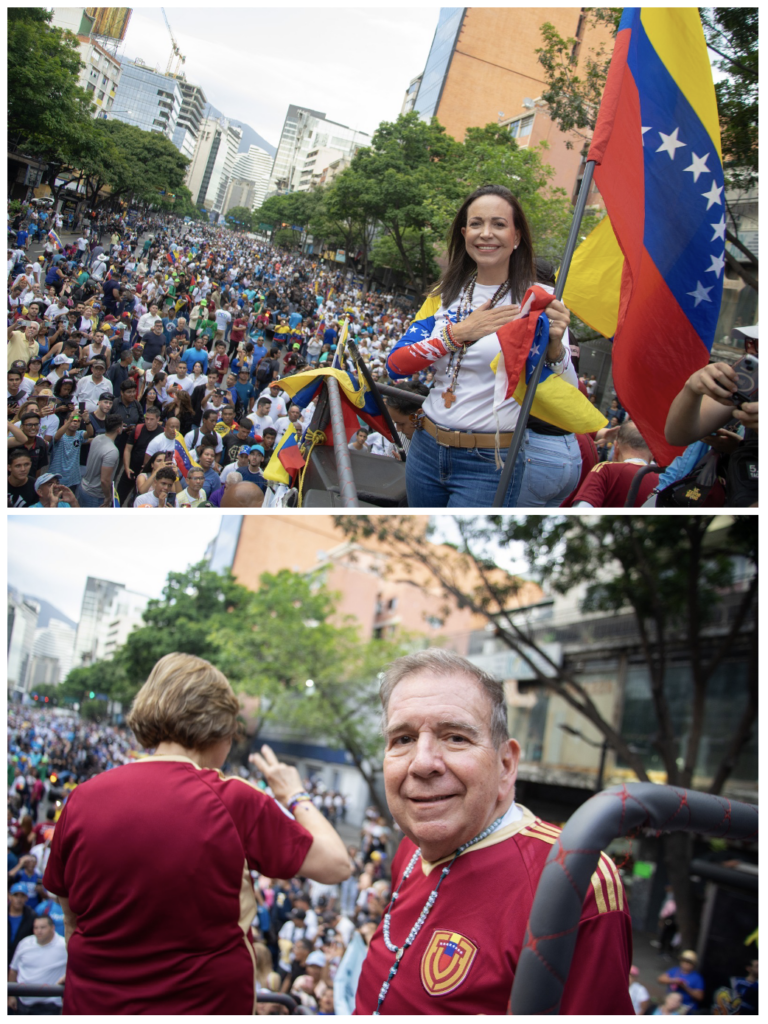
“I want my children to return, even if it’s just to visit,” said Grimaldo López, a carpenter from Petare who carries an old flag full of signatures and opposition symbols from the protests and rallies of the last 25 years. “María Corina is not the genie from I Dream of Jeannie. This is everyone’s problem. We are all co-responsible for recovering this country.” The feeling of a negotiated transition seems to have penetrated even the opposition bases: “We are not here for a witch hunt,” he says, “our priority is to recover the country, reactivate the economy and generate confidence so that new investments can come.”
In the crowd, which swelled each minute without moving forward, a youth activist from Voluntad Popular carried a poster of Jeancarlos Rivas –a 19-year-old activist recently detained in La Guaira. By the start of the campaign, 50 people had been arrested for political reasons. That day, outside Caracas, at least 15 more would join the list. Is she afraid? “I have a lot of faith and conviction,” she responds, “with the 28th [of July], with tomorrow, with the 29th and with all the days that lie ahead. I have never thought about leaving the country.”
The reasons to attend the march are multiple. “My suffering is a dental surgery that I cannot perform because it is very expensive,” says Milagros López, a pensioner from La Candelaria who receives 230 bolivars a month (about $6). On her forehead she wears a tricolor bandana that says “Edmundo for everybody.” A mother wearing a t-shirt from the Faculty of Medicine of the Central University of Venezuela stays close with her little son. “Mommy, they’re coming,” the child announces happily. Indeed, a truck with Machado and González Urrutia –wearing a Vinotinto t-shirt, like his wife and daughter– approaches followed by another truck with opposition figures such as Delsa Solórzano, María Beatriz Martínez, Juan Pablo Guanipa and Corina Yoris.
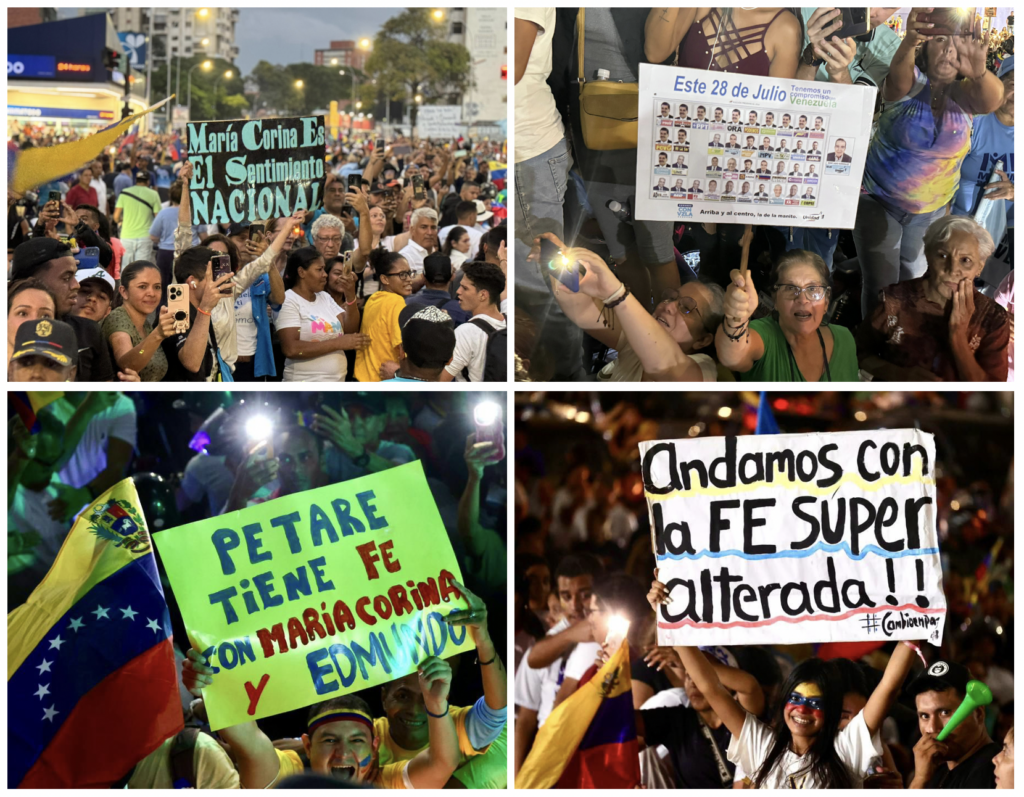
Then, Chacao seems to wake up. Office workers gather at the doors of the towers on Avenida Francisco de Miranda. Groups of neighbors come down from the buildings or appear with flags on the balconies. Small human silhouettes pop up on the rooftops and heliports. Machado and González Urrutia limit themselves to greeting and sending kisses to the crowd, but euphoria takes over the concentration as more and more people join. Machado’s emotional connection with the crowd is clear. A man shouts: “La libertadora! La libertadora!” By the time the human sea overflows over the Plaza Altamira, it is noticeable how diverse the concentration is: motorizados, informal workers, sifrina ladies, nuns, teachers, nurses, businessmen from the nearby towers, young people, the elderly, inhabitants of the five municipalities of the city.
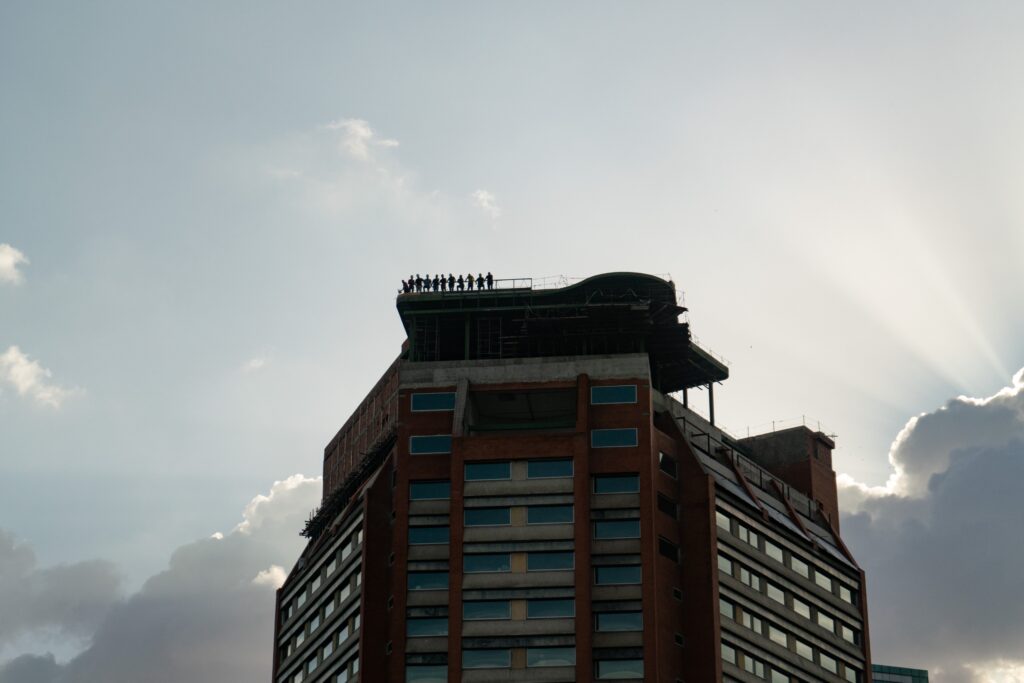
“A caravan of Chavista motorizados is coming,” a friend texts to me. But the caravan appears and begins to greet and send kisses to Machado. Just as excited as the opposition marchers, some ‘Chavista’ motorists claim that they only attended the Chavista rally because of coercion or monetary benefits. “Maduro, fuck you!” one shouts, “You gave me free gasoline so I could come to my aunt María Corina’s march!” I replied to my friend: “They came to greet María Corina.”
Since that sedative that dollarization was and the lukewarm liberalization of the economy starting in 2019, Caracas seemed to forget about politics. “[Rafael] Lacava is Chavista because he cannot be anything else, Chavismo has the cultural hegemony of the country,” a former supporter of Hugo Chávez stated on Twitter in 2021. “It is Chavismo’s right-wing turn and the conquest of a new niche: the depoliticized.” On the other side of the political spectrum, columnist Alejandro Armas proclaimed a ‘”depoliticization of the masses” in the face of little expectation of change while political scientist Guillermo Tell Aveledo spoke of ‘disillusioned harmony’: ” Faced with the tenuous expectation of economic prosperity, and the growing security of political stagnation, we take refuge in absence from the public,” he wrote in December 2021. “It is surprising how quickly this disillusionment has corrupted us.” The fight for civil and democratic liberties, as if by the grace of that ephemeral illusion that was the ‘Venezuela is fixed’ period until the beginning of last year, seemed buried by super-department stores, decorative palm trees on the Guaire River, shiny new towers of glass, bodegones with ten thousand imported products and chic cafes.
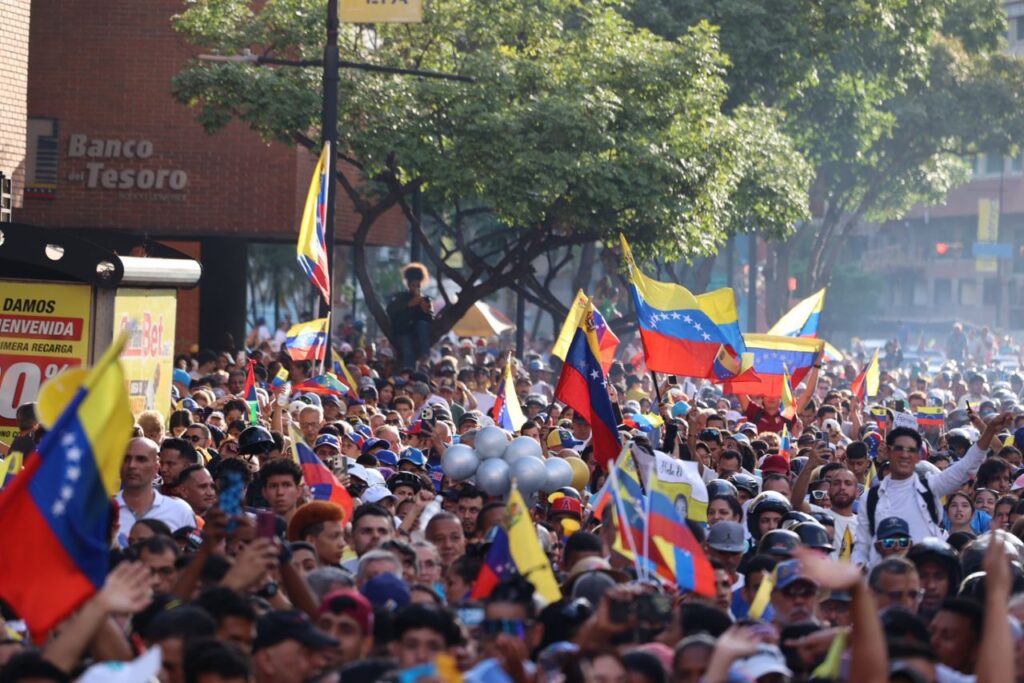
And the electoral season, at least until Thursday, July 4th, seemed to announce the victory of depoliticization in the oasis that is Caracas: devoid of the usual electoral paraphernalia of previous years beyond ambiguous murals and a few billboards of unremarkable candidates. But this crowd on July 4th announced the return of politics to the capital. If this latest round of the campaign, focused on the big cities, represents anything, it is the survival of the opposition identity –of the idea of a rupture; of a political change– under the walls of artificial grass and imported Nutellas. Suddenly, the seven-star flags return and the crowd –despite the promises of analysts who assured the definitive twilight of the opposition’s massive mobilizations– chants slogans promising the end of the Chavista period.
If this latest round of the campaign, focused on the big cities, represents anything, it is the survival of the opposition identity –of the idea of a rupture; of a political change– under the walls of artificial grass and imported Nutellas.
The march, intertwining walking and motorized crowds, begins to feel like an avalanche once it reaches the vicinity of Parque del Este. There, you feel a human tidal wave. So, like several colleagues from the press, the Comando por Vzla team invites me to get on the truck. I run, dodging human chains, until I manage to climb onto the truck once the march enters the Sucre municipality. I cannot believe what I see. The concentration has nothing to envy of its predecessors in 2017 or 2013.
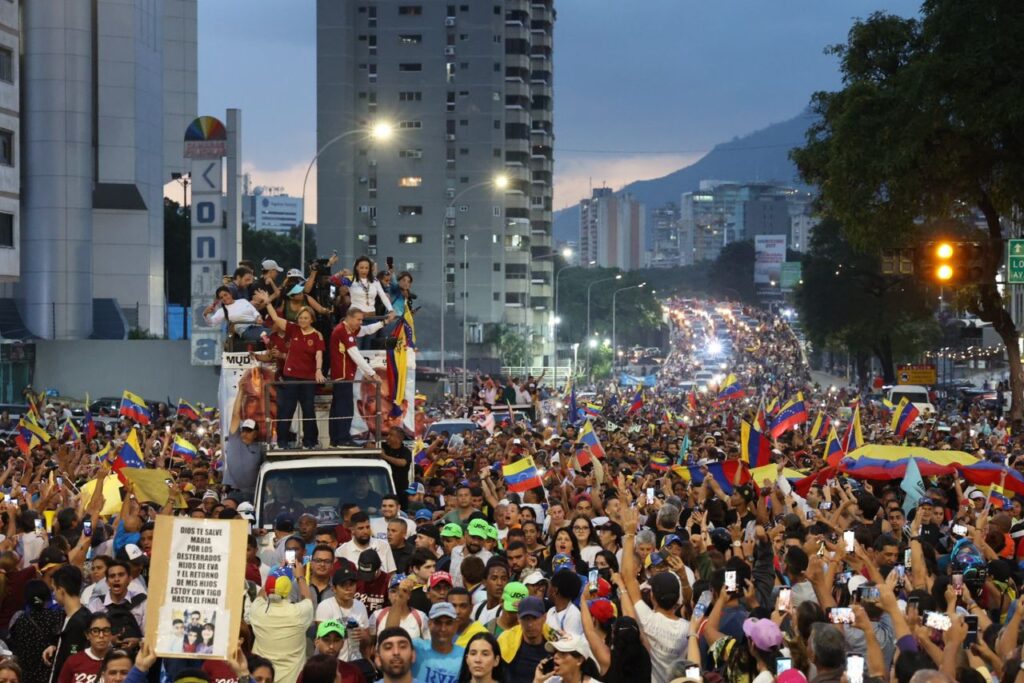
In front and behind, a carpet of hundreds of thousands of heads with flags and signs and smiles and cries, covering –bustling and boisterous, sparkling and splashing– every space of the long avenue and the elevated areas without noticing where it begins and where it ends. Ahead of me, González Urrutia and his wife Mercedes greet the crowd. On the sides, hundreds peek out from residential blocks. Music resonates, from the artificial intelligence jingle in favor of González Urrutia to the nostalgic Caracas en el 2000. Machado smiles and constantly pops out to greet people. There are cell phone flashlights on and people gathered under Chávez signs and communal councils near El Marqués.
“Did you expect this from Caracas?” I ask her. “I expect everything from Caracas,” says Machado with an emotion that she cannot contain when observing the human flow behind her. “What do you expect for the closure?” Machado is silent for a second. “Everything!” she says with a laugh. Then, upon arriving in front of the Líder shopping mall, the truck stops, and the González-Machado duo gives a short speech. The crowd, as in a cyberpunk film, watches it under the luminous logos of Banesco and the Forum supermarket. “We are going to once again be the Republic of Venezuela that we want so much,” says González Urrutia, using the name the country had before 2000. “Thank you, Caracas,” says Machado, “from this moment on we can say, like our Anthem: follow the example that Caracas set.” Thus, under the thousand billboards and in front of the hypermarkets, Caracas –which they tried to transform into the Casablanca of Madurismo– joined the political earthquake that is shaking the country.
Caracas Chronicles is 100% reader-supported.
We’ve been able to hang on for 22 years in one of the craziest media landscapes in the world. We’ve seen different media outlets in Venezuela (and abroad) closing shop, something we’re looking to avoid at all costs. Your collaboration goes a long way in helping us weather the storm.
Donate




